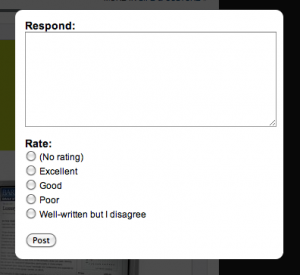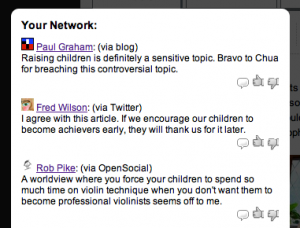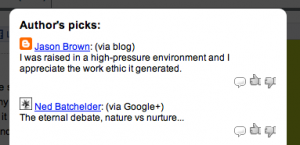Opine is a proposal for taking the closed comment modules that exist on websites around the world, opening them up and unifying the commenting experience across the internet:
Design details
Here is a prototype (no longer active). It's the same one used in the video and it's not yet very functional, just motivational. :) Once you get there, press any key to pull up the commenting layer or wait a few seconds for it to come up automatically.
(Disclaimer: The authors' names I chose are popular internet personalities and bloggers I follow, but the comments are entirely made up just so I could throw a prototype together! Although they represent some of the sentiments I remember reading around the internet, I made no attempt to match people with their true opinions. If I have offended you by the quote I've flippantly put next to your name, then first of all I'm honored that you read my blog! Second, let me know in the comments and I can remove you from my prototype.)
The form on the right is where you can leave comments and rate the underlying article. The interface should be expandable so it supports long-form comments as well as shorter ones. It should integrate with a user's blog and social networks, offering the option to automatically post to those venues, when appropriate. In the rating options, I have specifically included an evaluation option of "well-written but I disagree". Not everyone will use it, but many people are open-minded and willing to hear alternative viewpoints when they are presented in an articulate manner. An important goal of opine is to help the internet mature from an echo chamber into a place for productive disagreement.
The sections in the other columns are different categories of comments specifically relevant to you, the user. The one on the top left shows discussion by your friends and those you follow on your social networks. Only short-form comments are shown, but it is intended that longer responses from blogs and other sites will be referenced even if they can't be fully included. These comments are aggregated directly by the browser from blogs and social networks across the internet, which means the content owner can't censor the discussion or stifle dissent, when it comes from those you respect.
But Opine is not meant to exclude the author from the ensuing discussion. Indeed, there is probably no voice more important to include. For this reason, you will see another very important section of the page at the top of the second column, the author's picks, where the author can provide responses and highlight third-party comments that enhance the discussion. Additionally, the system will provide hooks for the content owners to be notified when comments are left anywhere on the internet and a plug-in architecture for websites to integrate the comments back into the underlying webpage if they desire.
The other two sections, "recommended" and "popular", are mainly placeholder sections at this point. They are examples of categories that would be very useful to people and we hope they can be implemented at some point, but both of them will probably require third-party aggregation services to function properly, so they may not qualify for the initial version of Opine. In general, the commenting layer will be configurable and extensible with skins and add-ons, and these sections might be great candidates for add-ons by competing aggregation services.
Opine will probably start out as a browser extension, but it is the type of feature that would be useful to people who aren't technical enough even to install a browser extension. Since we don't want to exclude them from the discussion that takes place, hopefully Opine will progress to a point where it can be considered for inclusion in the core browser functionality.
Benefits for news organizations
As a Knight-Mozilla project proposal, it's important to address the benefits this project from the perspective of a news organization.
Opine can rescue news organizations from the work of implementing and maintaining their own commenting system and save them a lot of the drudgery of moderating it. It will also allow the news organizations to pool their resources, if they desire, in creating valuable tools to monitor the comment stream, curate the author's picks section, and provide add-ons to help their users participate in the stream.
As I said in the beginning of the video, commenting on article webpages is becoming less useful by the day as more of our discussion happens on blogs and social networks across the internet. Comment threads on websites need a fundamental re-organization to maintain their relevance in today's framework of social discussion.
The ultimate reason for news organizations to get involved in this project might be that it will happen even without them. Witness Re:Poste, a project by a fellow MozNewsLab participant. And Google Sidewiki. And Chatifier. All are projects to further separate webpages from the commenting and discussion about them. And, to be honest, as this project has developed in the back of my mind for the past few years, the idea to involve news organizations and make sure they play their deserved role in the open commenting layer never once entered my mind until I became involved with MozNewsLab. By supporting and promoting the development of an open commenting layer for the internet, news websites can proactively create a future of comment threads that they can be involved in, instead of being increasingly marginalized by the flight of substantive commenting to blogs and social networks.


